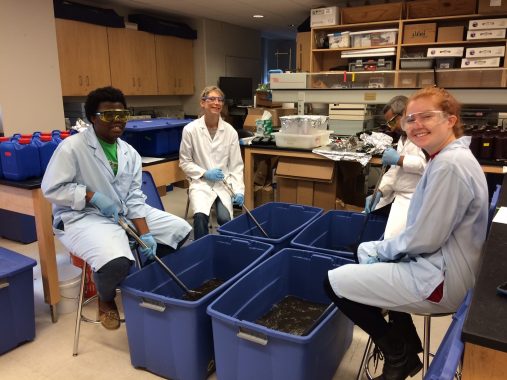Laidlaw Scholars Program Components
 The Laidlaw Undergraduate Research and Leadership Program seeks to cultivate tomorrow’s leaders across all disciplines through independent research and leadership development programming.
The Laidlaw Undergraduate Research and Leadership Program seeks to cultivate tomorrow’s leaders across all disciplines through independent research and leadership development programming.
Key program components include:
Research Project
There are three models for finding research projects:
- Individual Research Project: The student may identify an individual research topic and request work one-on-one with a faculty mentor.
- Preexisting Research Project:
- Tufts Faculty: Use the list of Tufts faculty to learn what they are working on. You will need a statement of support from the faculty member. Mentors are not limited to this list.
- Faculty at another Laidlaw School. For example at St. Andrews in Scotland. As with Tufts Faculty, you will need to get a recommendation letter from the faculty member.
- Group Research Project: A faculty mentor may work with a team of up to five undergraduate researchers. Projects can be thematic in nature, with each student pursuing his or her own research question and approaching the project from different disciplines. Each student choosing this pathway will need to submit their own application for consideration and students will be considered independently.
All scholars will develop, pursue, and report on a research question along with their faculty mentor over the course of at least one summer (for a list of faculty willing to work with Laidlaw Scholars, please see the Faculty Involvement page). Students are encouraged to explore faculty websites and speak with faculty that they are interested in working with as soon as possible. Faculty can work with the student to help create a research plan. Students who have enrolled in summer courses are not precluded from participating.
Research projects can be in any discipline. Projects may have an international dimension. Following each summer research period, scholars and their faculty mentors will participate in a research day in which their findings are shared with the broader community. The research project may culminate in the student’s senior honors thesis if they choose.
Leadership Development
Leadership development is an important component of the Laidlaw Scholarship. Along with conducting research, scholars will also participate in a leadership development program. The leadership component of the scholarship will include workshops, trainings, and events, along with more informal mentoring opportunities.
Leadership development programming will begin in the spring before the scholar’s first summer research period and continue throughout their time as a Laidlaw Scholar. Participation in all leadership development activities is mandatory.
Key elements of the program are:
- Six days of leadership training - three sets of two day workshops in late May 2023, January 2024, and late May 2023.
- Leadership Lecture series - lectures covering leadership topics during the term and over the summer.
- One summer research period of six weeks - after the May retreat through the start of the next school year. You will undertake a research project chosen from a list of projects or devised by yourself. You will be supervised by a mentor of your choice.
- An immersive leadership of six week Leadership in Action component in your second summer.
- Participate in a leadership intensive program e.g. a leadership expedition chosen by the Laidlaw Foundation
- Leadership placement in an organization where you lead others while you create, plan and implement a strategy.
- Research – Infield application of the scholar’s research project putting the findings of the first year’s project into action with the aim of creating positive change in society.
Laidlaw Leader Attributes
| Leadership Abilities | - Able to lead without authority - Able to convey purpose and build coalitions - Cultural intelligence and capacity for empathy |
| Self-Knowledge and Awareness | - Honestly assesses own knowledge and leadership style/preferences - Knows own limitations and acts accordingly - Learns continually |
| Effective Communicator | - Speaks and writes clearly and confidently - Able to listen with understanding - Uses digital connectivity |
| Critical and Creative Thinker | - Able to make effective decisions in complex environments - Seeks out and fosters innovation and creativity - Strong intellectual ability - Turns ideas into action |
| Collaboration and Team Working | - Builds relationships and networks - Works collaboratively and across boundaries - Uses emotional intelligence to achieve this - Capitalizes on the power of diversity |
| Social and Cultural Intelligence and Awareness | - Able to navigate new and foreign situations - Uses this to build relationships and networks |
| Resilience and Determination to Achieve | - Has energy and impact - Makes things happen |
| Research and Project Management Skills | - Able to analyze data and interpret results - Able to work and think independently - Prioritizes activities and manages own time |